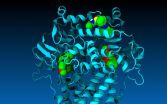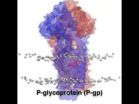(Press-News.org) Researchers at Southern Methodist University, Dallas, have discovered three new drug-like compounds that could ultimately offer better odds of survival to prostate cancer patients.
The drug-like compounds can be modified and developed into medicines that target a protein in the human body that is responsible for chemotherapy resistance in cancers, said biochemist Pia D. Vogel, lead author on the scientific paper reporting the discovery.
So far there's no approved drug on the market that reverses cancer chemotherapy resistance caused by P-glycoprotein, or P-gp for short, said Vogel, a biochemistry professor at SMU. One potential drug, Tariquidar, is currently in clinical trials, but in the past, other potential drugs have failed at that stage.
"The problem when a person has cancer is that the treatment itself is composed of cellular toxins -- the chemotherapeutics that prevent the cells from dividing. Usually upon the first chemo treatment the cancer responds well, and initially goes away. Ideally it doesn't come back," said Vogel, who is director of SMU's Center for Drug Discovery, Design, and Delivery.
"Sometimes, however, the cancer returns," she said. "The reason often is that some of the cancer cells "learn," after the first rounds of chemotherapy, how to make a lot of this P-gp pump. The normal function of P-gp is to pump toxins from cells, so it has evolved to protect cells against a large variety of toxins, including almost all currently available chemotherapeutics. After initial exposure, the cells surviving the chemo make so much P-gp that it allows the cells to pump the chemotherapy drugs straight back out of the cells during subsequent rounds of treatment."
As a result, P-gp causes resistance of the diseased cells to a majority of drugs currently available for the treatment of cancer, as well as drugs used for treatment of infectious diseases like HIV/AIDS.
Using computer-generated model speeds up the drug discovery process
The new drug-like compounds discovered by Vogel and her co-authors offer hope that using a computer-generated P-gp model, explained here http://bit.ly/1LVmR7a, developed to accurately mimic the physical, chemical and biological functions of the protein in the human body, will speed up the drug discovery process and work in real life as well.
"These are not drugs yet. We still have to develop them before they can go in the clinic," Vogel said. "But what we know now is that they're not toxic -- they have low toxicity to noncancerous cells, so that's a pretty good predictor that they may be good candidates for drug development. But we need to do much more work."
A pharmaceutical hit compound, like those discovered by Vogel and her co-authors, is a compound that is a promising candidate for chemical modification so it can eventually be delivered to patients as a therapeutic drug. In the case reported here, the compounds were commercially available for testing. The timeline from drug discovery to development to clinical trials and approval can take a decade or more.
Vogel and her co-authors, SMU biologist John G. Wise, and doctoral candidates Courtney A. Follit and Frances K. Brewer, reported their findings in the journal Pharmacology Research & Perspectives. The article, "In silico identified targeted inhibitors of P-glycoprotein in culture," is published online at http://bit.ly/1JjFizg.
The research was funded in part by the National Institutes of Health. The lab was recently awarded a second grant from the Institute.
Researchers virtually screened 15 million drug-like compounds via SMU supercomputer
The SMU researchers discovered the three hit compounds after virtually screening more than 15 million small drug-like compounds made publically available in digital form from the pharmacology database Zinc at the University of California, San Francisco.
Using SMU's ManeFrame high performance computer, Wise ran the compounds through a computer-generated model of P-gp. The virtual model, designed and built by Wise, is the first computational microscope of its kind to simulate the actual behavior of P-gp in the human body, including interactions with drug-like compounds while taking on different shapes.
The ultra-high throughput computational searches by ManeFrame led the researchers to 300 compounds that looked like they may inhibit P-gp. The researchers then tested 38 of those in their physical lab and found four that inhibited the biochemical function of P-gp, stopping it in its action.
Each of the four compounds was then tested in the lab to see how it would affect a line of prostate cancer cells relatively sensitive to the chemotherapeutic Paclitaxel, commonly used to treat prostate cancer patients. Also, each was tested on a companion cell line already multi-drug resistant, as if the patient already had undergone chemotherapy using Paclitaxel.
The researchers found that with three of the four compounds, they were able to push back the sensitivity of the resistant cancer line to the level of the non-resistant one.
"So the compounds re-sensitized the cancer cell lines to a really high degree, just as if the cancer was seeing the chemotherapy for the first time," Vogel said.
About 14 percent of men will be diagnosed over their lifetime with prostate cancer, according to the National Cancer Institute. Survival is highest if diagnosed early before it has spread, the institute reports.
INFORMATION:
SMUResearch.com on Twitter, http://twitter.com/smuresearch.
For more information, http://www.smuresearch.com.
SMU is a nationally ranked private university in Dallas founded 100 years ago. Today, SMU enrolls nearly 11,000 students who benefit from the academic opportunities and international reach of seven degree-granting schools. For more information see http://www.smu.edu.
SMU has an uplink facility located on campus for live TV, radio, or online interviews. To speak with an SMU expert or book an SMU guest in the studio, call SMU News & Communications at 214-768-7664.
Using "mini-brains" built with induced pluripotent stem cells derived from patients with a rare, but devastating, neurological disorder, researchers at University of California, San Diego School of Medicine say they have identified a drug candidate that appears to "rescue" dysfunctional cells by suppressing a critical genetic alteration.
Their findings are published in the September 8 online issue of Molecular Psychiatry.
The neurological disorder is called MECP2 duplication syndrome. First described in 2005, it is caused by duplication of genetic material in a specific ...
ALEXANDRIA, VA--The latest research on hearing loss, head and neck cancers, sleep apnea and other otolaryngic topics will be presented in Dallas, TX, September 27-30, at the 2015 Annual Meeting & OTO EXPO? of the American Academy of Otolaryngology--Head and Neck Surgery Foundation (AAO-HNSF), the largest annual meeting of ear, nose, throat, head and neck physicians in the world.
Abstracts of the research to be presented are now available online at http://oto.sagepub.com/content/153/1_suppl.toc. The 2015 Annual Meeting features more than 380 oral and 180 poster presentations ...
ATLANTA - September 8, 2015-New American Cancer Society Cancer Survivorship Care guidelines released today provide primary care clinicians with recommendations for providing comprehensive care to the estimated 1.2 million survivors of colorectal cancer in the United States.
The guidelines are the second to be published in a series of cancer survivorship care guidelines developed by the American Cancer Society. They provide guidance on identifying and managing potential physical and psychosocial long-term and late effects of colorectal cancer and its treatment, as well ...
PITTSBURGH, Sept. 8, 2015 - Young people across the United States who smoke electronic cigarettes are considerably more likely to start smoking traditional cigarettes within a year than their peers who do not smoke e-cigarettes, according to an analysis led by the University of Pittsburgh Center for Research on Media, Technology, and Health (CRMTH) and the Dartmouth-Hitchcock Norris Cotton Cancer Center. The study, funded by the National Cancer Institute (NCI), was the first to assess this relation in a national U.S. sample of youth, and to include people older than 18 ...
Continued smoking after a diagnosis of multiple sclerosis (MS) appears to be associated with accelerated disease progression compared with those patients who quit smoking, according to an article published online by JAMA Neurology.
MS is a neurogenerative disease and smoking is one of its known risk factors. While MS begins with an initial course of irregular and worsening relapses, it usually changes after about 20 years into secondary progressive (SP) disease. The time from onset to conversion to SPMS is a frequently used measure of disease progression.
Jan Hillert, ...
About one-third of girls and boys who survived child trafficking experienced physical and/or sexual violence during their ordeal in a study of children receiving posttrafficking services in Cambodia, Thailand and Vietnam, according to an article published online by JAMA Pediatrics.
Many of these survivors of child trafficking in the Greater Mekong Subregion of Southeast Asia screened positive for depression, anxiety and posttraumatic stress disorder (PTSD), and mental health symptoms were associated with self-harm and suicide ideation, according to the article.
Millions ...
A new study of U.S. adolescents and young people suggests that using electronic cigarettes was associated with progression to traditional cigarette smoking, according to an article published online by JAMA Pediatrics.
Some studies suggest e-cigarettes may help smokers reduce the use of traditional tobacco products. Still, there is concern that e-cigarette marketing could position the product to recruit nonsmokers and the use of e-cigarettes has increased among both adolescents and young adults.
Brian A. Primack, M.D., Ph.D., of the University of Pittsburgh School of ...
The California Public Employees' Retirement System (CalPERS) saved $7 million on spending for colonoscopy two years after it implemented a reference payment initiative that offered full insurance coverage at low-priced facilities but required substantial cost sharing if patients picked a high-priced alternative, according to an article published online by JAMA Internal Medicine.
Some employers are experimenting with payment methods that seek to counter high health care prices while upholding consumer access to valuable services. Employers, insurers and consumers face ...
In 2011-2012, the estimated prevalence of diabetes among U.S. adults was 12 percent to 14 percent and the prevalence of prediabetes was 37 percent to 38 percent, indicating that about half of the U.S. adult population has either diabetes or prediabetes, according to a study in the September 8 issue of JAMA. Though data from recent years suggests that the increasing prevalence of diabetes may be leveling off.
Diabetes is a major cause of illness and death in the United States, costing an estimated $245 billion in 2012 due to increased use of health resources and lost productivity. ...
Over the last 20 years, complications have decreased and survival has improved for extremely preterm infants, according to a study in the September 8 issue of JAMA.
Advances in medicine over the past 2 decades have changed care for mothers in preterm labor and for extremely preterm infants. Evaluation of current in-hospital complications and mortality data among extremely preterm infants is important in counseling families and considering new interventions to improve outcomes. Barbara J. Stoll, M.D., of the Emory University School of Medicine, Atlanta, and colleagues ...

